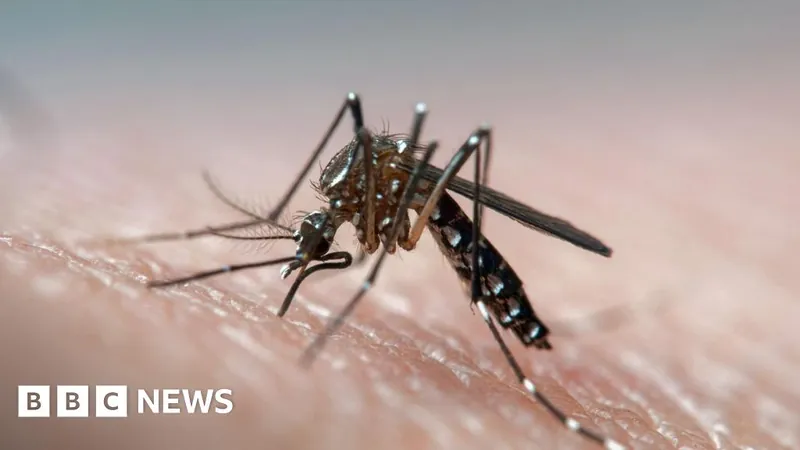
Shocking Breakthrough in Dengue Control: Scientists Render Male Mosquitoes Deaf!
2024-11-05
Author: Amelia
Introduction
In a groundbreaking twist in the fight against mosquito-borne illnesses such as dengue, yellow fever, and Zika, researchers have discovered a novel approach that involves rendering male mosquitoes deaf, effectively hindering their ability to mate. This innovative strategy could potentially lead to a drastic reduction in the populations of these disease-carrying insects.
Mosquitoes and Mating Behavior
Mosquitoes engage in aerial copulation, with males depending on their acute sense of hearing to locate females by tuning in to their rhythmic wingbeats. However, scientists at the University of California, Irvine have tinkered with the genetic pathways that govern this auditory sense. In their experiments, these genetically-modified male mosquitoes no longer communicated with females—some remained isolated for up to three days without making contact.
Impact on Disease Transmission
Female mosquitoes are notoriously the culprits behind transmitting diseases to humans, meaning that curbing their reproduction could be a vital step in controlling outbreaks. The study focused on the Aedes aegypti species, notorious for affecting approximately 400 million individuals annually.
Genetic Manipulation Findings
Researchers observed the mosquitoes' mating rituals, which can last from just a few seconds to nearly a minute. Through genetic manipulation, they targeted a protein integral to sound detection, known as trpVa. The outcome was astonishing: the altered males displayed zero response to the sound cues that normally entice them.
Results and Implications
While normal male mosquitoes swiftly mated and fertilized nearly all the available females in their environment, the deafened variants faced complete failure in reproduction. The study, published in the journal PNAS, highlights the profound implications of this genetic intervention, leading to an "absolute" elimination of mating behavior among the modified males.
Expert Opinions
Dr. Joerg Albert, a prominent expert in mosquito reproduction from the University of Oldenburg in Germany, expressed optimism about the potential of this research direction. He remarked, "This study offers a direct molecular insight emphasizing that hearing is not just important—it is essential for mosquito reproduction. Without the auditory capability to approach females, we could see a sharp decline in their numbers, possibly leading to local extinctions."
Looking Ahead
Additionally, Dr. Albert noted that other strategies, like releasing sterile males in areas heavily affected by mosquito-borne diseases, merit further exploration to bolster control measures.
Ecological Considerations
It is crucial to recognize that while mosquitoes can spread dangerous diseases, they also play a critical role in our ecosystems—serving as important food sources for various wildlife, including fish, birds, bats, and frogs, and contributing to pollination.
Conclusion
As this innovative research progresses, humanity may stand on the cusp of effectively battling the significant health risks posed by mosquitoes. Stay tuned for more developments in this intriguing scientific journey, which may transform how we manage and interact with one of nature’s most notorious pests!









 Brasil (PT)
Brasil (PT)
 Canada (EN)
Canada (EN)
 Chile (ES)
Chile (ES)
 España (ES)
España (ES)
 France (FR)
France (FR)
 Hong Kong (EN)
Hong Kong (EN)
 Italia (IT)
Italia (IT)
 日本 (JA)
日本 (JA)
 Magyarország (HU)
Magyarország (HU)
 Norge (NO)
Norge (NO)
 Polska (PL)
Polska (PL)
 Schweiz (DE)
Schweiz (DE)
 Singapore (EN)
Singapore (EN)
 Sverige (SV)
Sverige (SV)
 Suomi (FI)
Suomi (FI)
 Türkiye (TR)
Türkiye (TR)